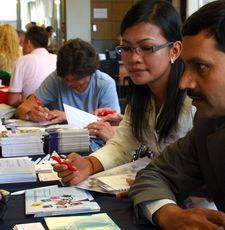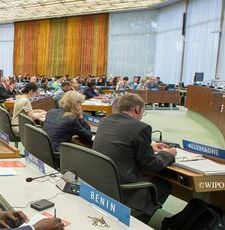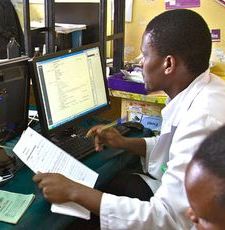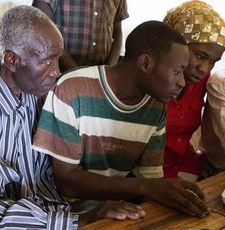Copyright law affects many library services and activities, so it is a core concern for librarians and library organizations. EIFL recommends that partner consortia adopt a statement of principles on copyright to raise awareness of the library perspective in copyright issues, and to put copyright on the agenda for consortium planning activities and strategy. It will provide a mandate for the consortium to discuss copyright issues with the national copyright office, raise the visibility of the consortium, demonstrate leadership to members on an important library issue, and help forge alliances with other stakeholders such as the national library association. It will also assist EIFL work internationally at WIPO.
Of course, as with all EIFL materials, it may be translated and adapted as required. Libraries or librarians from EIFL partner consortia are free to contact the EIFL-IP Programme for advice or support on developing their own statement of principles.
Browse the template online or click here to download the template and FAQs.
[Consortium Name
Consortium logo]
Statement of Principles on Copyright and Related Issues
- Optional background information:
- Role of Libraries
- Libraries and digital technologies
- Libraries and copyright
- To guide the formulation of national copyright law and policy, [CONSORTIUM NAME] asserts:
- We hereby adopt the following Principles:
- To acquire and lend library materials
- To enable effective library services
- To protect the public domain and to safeguard librarians
- Information about the consortium
Optional background information
Role of Libraries
The role of libraries the world over is to collect, organise, preserve and make available our cultural and scientific heritage for current and future generations. Libraries operate for the public benefit supporting education and training, access to knowledge, information and culture. Academic and research libraries play a central role supporting teaching, learning and research in universities, schools and other places of learning.
The delivery of high quality library and information services helps guarantee universal and equitable access to information and ideas that people, communities and organizations need for their social, educational, cultural, democratic and economic well-being.
Libraries and Digital Technologies
Digital technologies have changed how works are created, disseminated and used, as well as how libraries preserve and make these works available. Within a short time, the information landscape has been transformed, especially for academic and scholarly resources. Nowadays, the library is no longer confined to a physical place. Access to electronic library resources is often provided to users outside the library, on the university campus, at home or on the mobile device of the student or researcher.
Most electronic resources paid for by libraries are subject to a licence that sets inter alia the terms and conditions for use. It is important that licences do not override the rights of libraries and their users contained in national copyright law.
Libraries and Copyright
Copyright law governs the ownership, control and distribution of knowledge. The role of libraries is to provide people with access to knowledge and knowledge goods. This means that copyright law is a core concern for librarians and for organisations representing libraries.
The purpose of copyright is to encourage creativity and learning. It does this by granting legal protection to creators who may be rewarded for their work and, through exceptions and limitations, by providing reasonable access to society to encourage innovation, research and further creativity. The mechanism that enables the copyright system work effectively is the exceptions and limitations and a limited term of protection, combined with appropriate protection for rightsholders.
Exceptions and limitations are important to libraries everywhere. For example, they can allow a library to copy works in copyright for the purposes of preservation, research and teaching or to serve people with disabilities who require special formats for accessibility. Restrictive copyright laws with few or very narrow exceptions and limitations can create legal barriers to accessing resources for education, research and personal development. This can have significant consequences for libraries in developing and transition countries that have limited resources to pay for copyright-protected materials and whose capacity to access knowledge is crucial to social and economic development.
To guide the formulation of national copyright law and policy, [CONSORTIUM NAME] asserts:
Considering that libraries are distinctive guardians of the public trust, specifically designated worldwide as institutions serving the public interest to enable the advancement of knowledge and culture;
Acknowledging the essential role of digital technologies in the preservation, access and use of library materials that require mechanisms to enable libraries to respond appropriately to the digital environment to ensure the progress of research, scholarship, and culture;
Being aware of the WIPO Copyright Treaty’s recognition of “the profound impact of the development and convergence of information and communication technologies on the creation and use of literary and artistic works”, including “the need to maintain a balance between the rights of authors and the larger public interest, particularly education, research and access to information, as reflected in the Berne Convention”;
Committed to ensuring that libraries remain effective in their capacity to serve the interests of countries and their citizens in accessing and disseminating information and knowledge necessary for educational, scientific and development purposes especially across territorial borders in order to fulfill the promise of the digital age;
Aware of the importance of copyright to the production of literary and artistic works, whatever may be the mode or form of their expression;
Convinced of the educational, political, social, cultural, and entertainment-related benefits of the international and national copyright system;
Recognising that copyright limitations and exceptions are user rights that help maintain a proper balance between the interests of copyright owners and users of copyrighted works within a fair copyright system.
We hereby adopt the following Principles:
To acquire and lend library materials
Legal deposit for all formats
Legal deposit is an essential means for ensuring that the published heritage of a nation is acquired and preserved for the future. Legal deposit laws and systems should include works published in all formats and allow for preservation of these works.
Right to purchase works legally available in any country
Libraries should have the right to buy or otherwise acquire copyrighted works that are legally available in any country. In some countries libraries are prohibited from buying from third countries without special authorization from the rightsholder.The availability of works on the market is thus limited, and it can foster higher prices as there is less competition. (This represents an exception to the distribution right, also known as parallel importation).
Respecting copyright exceptions and limitations in contracts
Contracts (or licences) for the purchase of access to electronic resources should not be permitted to override exceptions and limitations in national copyright law. The goals and policies expressed through exceptions and limitations are important statements of national principle and public policy goals and should not be varied by private contracts.
Technological protection measures (TPMs) that prevent lawful uses
Libraries should be permitted to circumvent a technological protection measure for the purpose of making a non-infringing use of a work. Otherwise, the exceptions and limitations set out in national copyright law are effectively eliminated for much digital material.
Right to lend
Lending is a core, established library activity essential for education, learning, research, and culture. Lending by libraries should not be restricted in national legislation or by contractual provisions.
To enable effective library services
Preservation
A library should be permitted to make copies of published and unpublished works in its collections, including migrating content to different formats, for purposes of preservation.
Research or private purposes
It should be permitted to make a copy of an item for or by an individual user for research and study and for other private purposes.
Education and classroom teaching
It should be permitted for works that have been lawfully acquired by a library to be made available in support of classroom teaching or distance education, in a manner that does not unreasonably prejudice the rights holder.
Inter-library document supply
Libraries should be allowed to supply documents from other libraries in response to individual requests, either to the user directly or through the intermediary library in any format and by any means of communication.
General free use exception applicable to libraries
A general free use exception consistent with fair practice helps ensure the effective delivery of library services. General exceptions such as fair use and fair dealing complement specific library exceptions, and enable libraries to adapt services to emerging needs and technologies before specific exceptions are introduced into the law.
Serving persons with disabilities
A library should be allowed to convert material from one format to another to make it accessible to persons with disabilities. To avoid costly duplication of alternative format production and to enable people in developing countries, where 90% of visually impaired people live, to benefit from accessible material produced in other countries, cross-border uses should be permitted.
Use of orphan works
The growing number of orphan works, where the rights holder cannot be identified or located, is a hindrance for libraries that wish to make use of the materials, for example in digitization projects. A mechanism is needed so that libraries can utilise orphan works in an effective and efficient manner e.g. through a copyright exception.
To protect the public domain and to safeguard librarians
Protecting the public domain
Consistent with the Berne Convention, the general term of copyright protection should be no longer than the life of the author plus 50 years. The term of protection for copyright or related rights should not be further extended because a robust public domain provides new opportunities for creativity, research, and scholarship.
Limitation on liability
Libraries are critical intermediaries in fostering public access to information resources. Library staff strive to adhere to the law, and they respect the legitimate interests of rights holders. In fulfilling their public mandate librarians, who are not usually professionally trained in the law, commonly need to answer questions about copyright without the benefit of specialised legal advice. There should be a limitation on liability for libraries and library staff who act in good faith, believing or having reasonable grounds to believe, that they have acted in accordance with copyright law. By acting in good faith, the library is taking steps to understand and apply the law in a manner that respects all interests.
Information about the consortium
[Consortium name]
[About the consortium]
[Contact name and contact details]
[Date]
This content is licensed under a Creative Commons Attribution 3.0 License. Librarians and the public at large are encouraged to use, distribute, translate, modify, and build upon these materials, provided that they give EIFL appropriate credit. See EIFL copyright statement for more detail.









